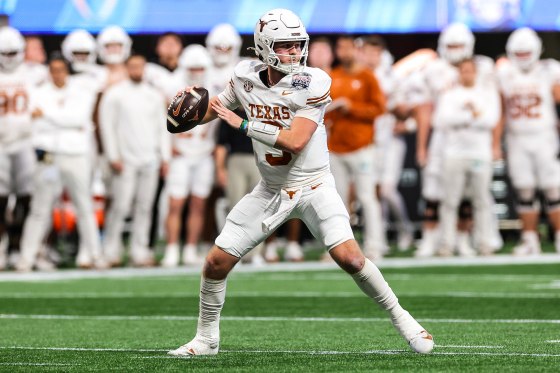In the summer of 2021, the nation’s top-ranked high school football recruit, Quinn Ewers, arrived on Ohio State's campus in what represented a recruiting coup.
Less than a year earlier, the teenage quarterback from the Dallas suburbs had backed away from his commitment to play for the Texas Longhorns and reopened his recruitment. Now, he was seemingly next in line to help the powerhouse Buckeyes win college football’s national championship.
More than three years later, Ohio State’s two dominant victories to open the College Football Playoff have landed it in Friday’s semifinal in Arlington, Texas. For Ewers, a national title is just two wins away.
Except now, he plays for Texas.
The reunion carrying national-title stakes would be remarkable as a football story alone. Jack Sawyer, a star Buckeyes defensive end who will spend Friday trying to sack Ewers, was once his roommate.
Both schools are trying to break title droughts. Texas last won a national title in the 2005 season and Ohio State in 2014. The winner will advance to the Jan. 20 national championship in Atlanta to face the winner of the other semifinal, between Penn State and Notre Dame.
“I don’t regret any decision I’ve made on going or anything like that,” Ewers told reporters ahead of Friday’s Cotton Bowl, the site of one semifinal. He said his relationships with many at Ohio State still “feel like if I’d see them walking down the side of the road, it would be like I was hanging out with them yesterday.”
Ewers’ story has also become one of the prime illustrations of the changes reshaping the NCAA.
More Sports from NBC News
- Body of Brian Matusz, former Baltimore Orioles pitcher, found at Phoenix home
- Team USA rugby star Ilona Maher makes Bristol Bears debut in front of record home crowd
- Quincy Wilson is an Olympic champion. He also has homework to finish.
- He's one of college football's winningest coaches — yet his own team's fans aren't sold on him
Beginning in June 2021, players were at last legally able to be compensated for the use of their names, images and likenesses (and, in the future, players also will be able to earn shares of the revenue their schools generate). At the same time, relaxed rules have made it easier than ever to transfer between schools without penalty.
Initially on track to graduate from high school in the spring of 2022, Ewers instead skipped his senior year of high school and reclassified to the class of 2021 to sign with Ohio State.
Part of his motivation was his relationships with coaches such as Ryan Day, who offered Ewers a scholarship when he was in the eighth grade. (“He was a boy at the time, really, who just had a tremendous release,” Day said.) But a significant factor in his decision to speed up his path to college, Ewers said Monday, was the opportunity to cash in on NIL payments as a collegiate athlete that he wouldn’t have been permitted to earn had he remained a high school student in Texas.
“One of the main things was that there was that, I don’t know if you guys remember or not, but the Texas Legislature wasn’t going to allow high school football players to be paid,” Ewers said. “And me and my family had a pretty big opportunity in front of us that we felt that it was a good decision for me to go on and forgo my senior year and enroll early at Ohio State and I have the opportunity to have some good money in our pockets as a family.”
Days before he stepped on campus at Ohio State in August 2021, Ewers announced his first endorsement — with a kombucha company. Soon, ESPN reported, Ewers had signed an NIL deal with a sports marketing company worth $1.4 million over three years.
After less than three months and one semester at Ohio State, Ewers transferred to Texas to play for the Longhorns’ new coach, Steve Sarkisian.
“The reason that I came back to Texas was, one, to be closer to where I’m from and just closer to the resources that I have and the relationships that I’ve built over time just being from Texas,” Ewers said.
As the Longhorns’ starting quarterback for the past three seasons, Ewers has tapped into those resources as lucratively as anyone in college sports. He has signed as many as 25 NIL deals, according to one tally by On3, with companies that make a variety of products, like tea, video games and jerky, as well as a streaming network.
Ewers might have one more twist in his career path still to come. In late December, On3 reported that Ewers, who could turn pro and declare for the NFL draft this month, has been offered $6 million by an unnamed school to enter the NCAA’s transfer portal and sign to play another season of college there. From strictly a financial perspective, Ewers is already one of the biggest winners of college sports’ new era of permissiveness. Now, he’s trying to be the big winner of the College Football Playoff’s ultimate prize.
Standing in his way, however, is his former team.
